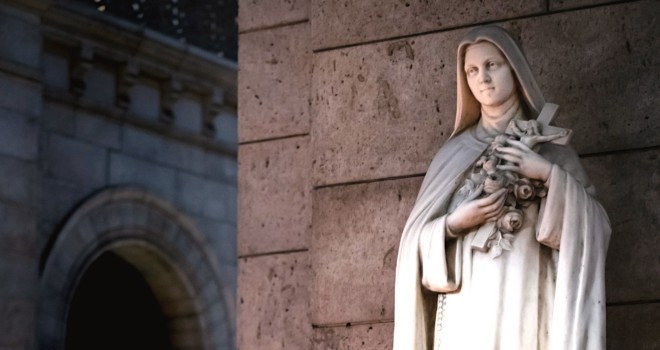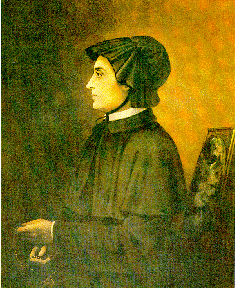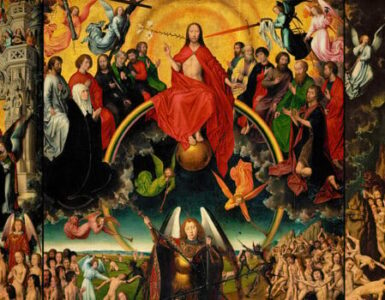The Catholic Church has so many saints. Some were young when they died, while others were advanced in age. All the saints strove to live holy lives. And lucky for us, many of them wrote reflections or memoirs that can inspire believers to this day.
One of the greatest saintly autobiographies we have comes from St. Therese of Lisieux, who was prompted by her blood sister and her religious sister in Carmel to write the story of her life. What St. Therese left behind was a spiritual legacy in which she recounted the key moments of her life.
As parishes throughout the world now are celebrating First Communion with their second graders, St. Therese shared a lot about her experience of First Communion. Saint Therese can help the young person in your life, whether that is a child or grandchild, niece or nephew, student or neighbor, enrich their First Holy Communion experience. Be sure to share this with them so that their First Communion day will be unforgettable just like St. Therese’s was!
1. Make a Special Request of God
What might come to mind here is to close your eyes, make a wish, and blow out your birthday candles. But that isn’t what I intend, nor did St. Therese suggest.
St. Therese had a very impressionable soul. The troubles of people she met along life’s journey found a way into her heart and prayer. One day as she was walking with her father, she saw a poor man, and she wanted to help me, but the man refused her alms. She wanted to help in some way, that she thought maybe she should give the man a piece of the cake her father just bought, but she realized a better way to help the man.
St. Therese writes:
I remembered having heard that on our First Communion Day we can obtain whatever we ask for, and this thought greatly consoled me. Although I was only six years old at this time, I said: “I’ll pray for this poor man the day of my First Communion.” I kept my promise five years later, and I hope God answered the prayer He inspired me to direct to Him in favor of one of His suffering members.
(Story of a Soul Study Edition, page 53-54)
On that special day, Therese resolved to pray for that man. That’s how much she cared for the poor. Nothing else could she give except the special graces that God could give the man on the day of her First Communion.
In our lives we encounter so many people. We might never know what happens to the person, but through our prayer we entrust them to God and ask Him to take care of them. That’s what Therese did. Encourage your First Communicant to formulate a special intention. It could be a sick family member or someone from school or the community. It might be that God will help someone in your family that is struggling. God wants to give a special grace. He wants us to ask. Don’t miss the opportunity.
2. Decide to Live A New Life
This really is the invitation for all believers each Sunday at Mass — to leave the Church and live differently because we met the Living God in Word and Sacrament. St. Therese knew this reality. She writes,
“One evening I heard you say that from the time one received one’s First Communion, one had to commence living a new life, and I immediately made the resolution not to wait for that day but to commence the very same time as Celine” (p. 86).
St. Therese had older sisters who inspired her in her spiritual life. Seeing her sisters receive their sacraments spurred Therese not to delay her own transformation. But with Celine, her much older sister, God invited her to begin living a new life as Christ’s disciple even before her First Communion.
Remind the First Communicant in your life that, because they are privileged to receive Jesus in Holy Communion, He now invites them to live as He commands — to love one another: parents, brothers and sisters, friends and enemies at school. Ask them, “How will your life be different because of First Communion?”
3. Remember the Special Day
The day of one’s First Communion is a special day. First and foremost because of the encounter with Jesus in the Holy Eucharist. It also is a day which families gather together and celebrate.
St. Therese described the day of her First Communion in this way: “The time of my First Communion remains engraved in my heart as a memory without any clouds” (p.116). Encourage the First Communicant in your life to write a journal entry about their special day. What do they remember? What was their prayer? What made the greatest impact on them?
Children have a special closeness to God and awareness of His presence. Give them an opportunity to share their thoughts and insights. They just might help us love Jesus and the Eucharist all the more!
4. Tell Jesus You Love Him
When the priest holds up the host and says, “The Body of Christ” and we say Amen, this is Jesus telling us how much he loves us. He tells us, “I love you so much that now I feed you with my very body and blood.” The love Jesus extends to us, demands a response from us.
St. Therese made this profession of love. She recalls, “Ah! How sweet was that first kiss of Jesus! It was a kiss of love; I felt that I was loved, and I said: ‘I love You, and I give myself to you forever!’” (121). Teach your First Communicant to go back to the pew, kneel, and to say a prayer telling Jesus how much they love Him and appreciate all He does for them.
5. Remember Those Who Have Died
The celebration of Mass unites us to the saints in Heaven. Our earthly liturgy participates in the heavenly liturgy. Right before we chant the Sanctus (Holy, Holy, Holy), the priest invites us to join in the unending hymn of the angels and the saints. We offer Masses for those who have died, to pray for them and a way to unite ourselves in prayer with those who have gone before us.
St. Therese experienced the death of her mother at a young age. On that special day of her First Communion, she did not forget her mother. She writes, “On that day, joy alone filled my heart and I united myself to her who gave herself irrevocably to Him who gave Himself so lovingly to me!” (p. 121). Her mother was a lover of God, and Therese desired to love Him with the same love that her mother had loved the Lord Jesus.
If the First Communicant in your life has lost a grandparent or a parent, tell them that they are able to unite themselves with those who have gone before them. From their place in eternity, they are a part of the special celebration.
6. Desire to Receive your Second Communion
The day of a person’s First Communion is only the beginning. They will make thousands of other communions in their life. The time in which St. Therese made her First Communion was much different than our time. Frequent communion, week after week, or day after day, was not common. One would have to receive permission from their spiritual director or priest to receive Holy Communion.
Therese writes, “Since that Communion, my desire to receive grew more and more, and I obtained permission to go to Holy Communion on all the principal feasts” (p. 123).
Whatever role you have in the life of a First Communicant, encourage their parents or other family members to take the student to Church each Sunday. When they go, they have the opportunity to know that the God who is love, loves them by coming to them in Holy Communion. Many graces are given to us at each Mass we attend. Don’t miss out on all that God wants to do in your life. Just as they received their First Communion, each communion going forward should be done in a similar fashion: formulate an intention, give thanks, pray for someone in need, commit to serving the Lord in your life, and use it as a time to remember those who have died.
The saints can teach us so much about receiving Holy Communion. They can especially deepen our appreciation for the Eucharist. With each and every communion we receive, let it be more devout than the previous, until we have communion with God, forever in Heaven.
✠
Photo by Stephanie LeBlanc on Unsplash












